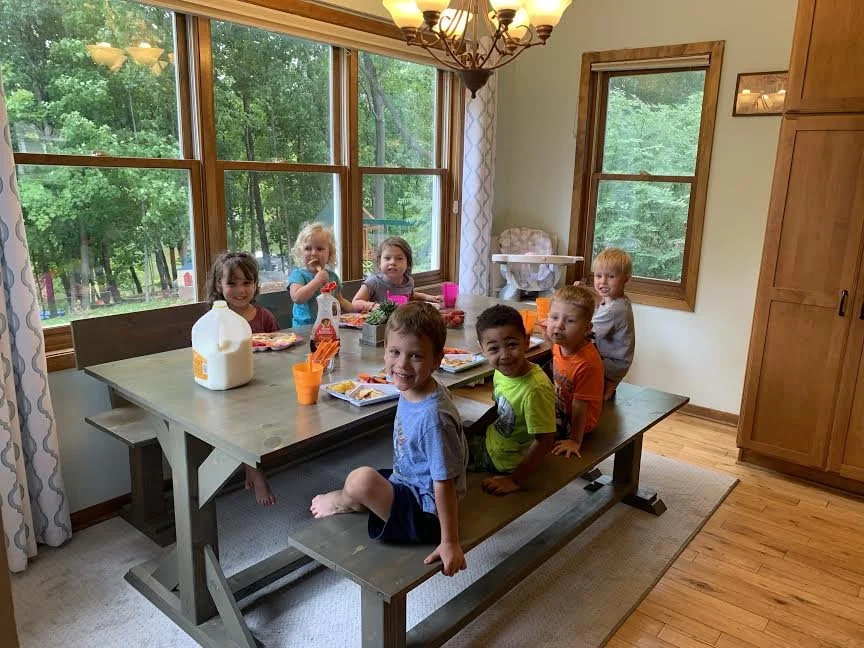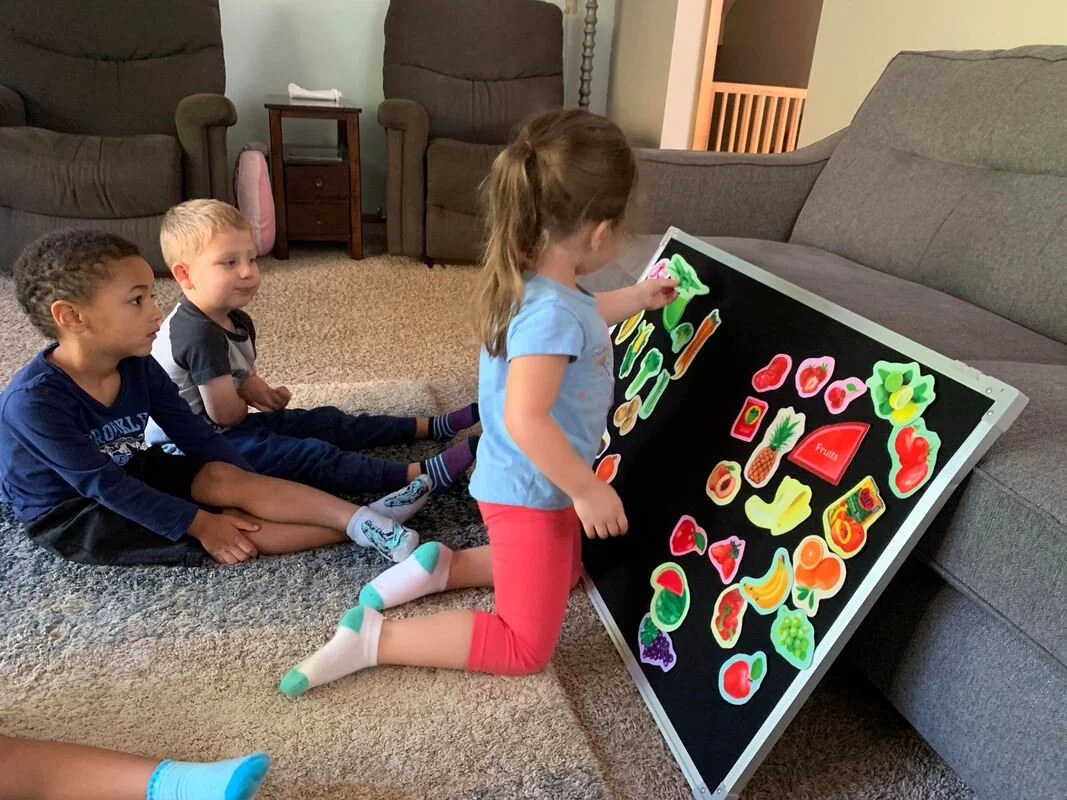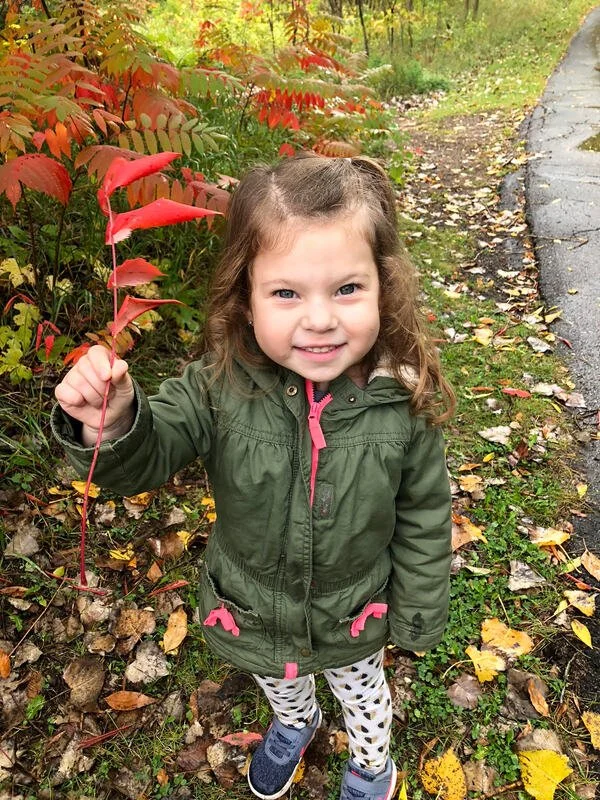
Health and Well-being
Fundamentals
Health and well-being in a family childcare setting are fundamental components that impact a child's development and overall quality of life. My primary goal is to help children get the nourishment and energy they need to learn and grow by providing healthy meals and plenty of time to run and play. Children who eat healthy meals and play actively several times a day are more likely to adopt healthy habits on their own as they grow.
Nutrition plays a pivotal role, as it directly influences a child's physical growth, cognitive function, and immune system. Providing balanced and nutritious meals not only supports the child's immediate health but also instills healthy lifelong habits.
Active play is crucial for physical development and promotes coordination and motor skills.
Fire safety is a paramount concern in any childcare setting. Regular drills, clear evacuation plans, and child-friendly discussions about fire safety contribute to a secure environment, fostering a sense of security and preparedness.
Creating a safe and stimulating outdoor space encourages exploration, social interaction, and a connection with nature, all of which contribute to the child's overall health and happiness.
By prioritizing things like nutrition, active play, outdoor playtime and fire safety, family childcare providers contribute to a comprehensive approach to health and well-being. These elements create an environment where children not only thrive physically but also develop socially, emotionally, and cognitively, laying the groundwork for a lifetime of well-being and healthy habits.
Nutrition
I am enrolled in the ACA (Adults and Children Alliance), a United States Department of Agriculture (USDA) program designed to improve the diets of children and adults in day care. The ACA provides nutrition training and meal reimbursement to licensed child care providers. I follow the food guidelines for all meals and provide breakfast, morning snack, lunch, and afternoon snack.
Learn how to eat healthy with MyPlate
Remember the food pyramid? Meet MyPlate, the official symbol of the five food groups.
MyPlate is a visual reminder to make healthy choices from each of the five groups. MyPlate.gov offers tips and resources that support healthy dietary patterns. Learn how to make MyPlate work for you with the Start Simple with MyPlate mini-poster in English or Spanish.
Learning about Healthy Eating
Sorting food by food groups
Using felt to make lunch menus
Review and practice different exercise activities
Coloring worksheet that go along with games
Active Play
Active play holds immense significance within a family childcare setting. Play provides a safe and secure environment where children can engage in various stimulating activities. It allows them to explore their boundaries, develop their creativity, and enhance their cognitive skills. Moreover, active play promotes social interaction among children, encouraging them to cooperate, share, and develop crucial communication skills. In a family childcare setting, indoor play also becomes an opportunity for the caregiver to actively engage with the children, fostering a strong bond and providing individual attention. Additionally, play enables children to develop their fine and gross motor skills through activities such as building blocks, art projects, or indoor obstacle courses.
Dress up & Super Heroes!
Who needs Halloween when you can play dress up all year! We have two dress-up bins and 10 hooks full of dress up clothes. The super hero capes are always a favorite!Pretend Play & Imaginary Play
During free play time, the children come up with creative ways to play. I have combined different bins of toys to come up with new games, such as building blocks, animal puppets or kitchen toys with dolls.Board Game & Card Games
When the weather keeps us inside we take the time to play games. We practice taking turns, sharing, winning/losing with grace, sportsmanship, and problem solving strategies.Water Fun
We have "car washes" and "toy washes" in the winter. This helps keeps toys clean and provides a new way to play.Building Forts
We use blankets, sheets, pillows and whatever we can find to build awesome forts to hide and eat snack in!
Outdoor Play
At Childcare lane we have structured our daily routine to include active outdoor play sessions, ensuring that every child engages in physical activity for at least every 30 minutes in the morning and again in the afternoon. We recognize the numerous benefits of outdoor play, from enhancing gross motor skills to promoting physical fitness and overall well-being. Outdoor play fosters social interactions, teamwork, and the development of important cognitive and sensory skills. Our commitment to regular and structured active outdoor play reflects our dedication to creating an enriching environment where children not only have the opportunity to explore and enjoy nature but also build a strong foundation for a healthy and active lifestyle that will benefit them well into the future.
Fall Activities
Leaf collecting
Leaf projects
Leaf book
Jumping in leaf piles
Nature hikes
Apple tasting and projects
Winter Activities
Building snowmen
Building snowforts
Short walks
Making snow angels
Sledding
Ice skating
Backyard play
Winter art projects
Holiday art crafts
Spring Activities
Walks along the trails
Flower picking
Getting back outside to play
May Day baskets
Rainbows and spring art projects
Summer Activities
Water fights
Ice cream or popsicle treats
Puddle jumping
Playing at the parks or baseball field
Walks to the waterfall along the trail
Jumping in the bounce house
Outside obstacle courses
Meeting Police Officers
Fire Safety & Emergency Practice
At Childcare Lane, we prioritize the safety and well-being of our children above all else. With fire safety being a crucial aspect of our daily routines, we ensure that our little ones are well-prepared and educated about fire prevention. Regular drills and discussions about fire safety rules are a part of our curriculum. One of the essential skills we teach them is the "Stop, Drop, and Roll" technique. In case of any unfortunate encounter with flames, our children learn to stay calm, quickly drop to the ground, cover their faces, and roll back and forth to extinguish any fire on their clothes. By instilling this important skill, we equip our children with the tools to react wisely, promoting a safer environment for all within our childcare.
Fire Safety Project
We painted a box with red and orange paint. We use this as our pretend fire to practice escape routes. For example, we put the box in the kitchen and then practice leaving through the front or side door. We bring the emergency bag along with us. We also practice the Stop-Drop-Roll technique for fire spreading prevention.Tornado Drills
We practice going downstairs and into the hallway behind the stairs in case of an emergency. We bring our emergency bag along.Emergency Situations
We practice calling 911 on the phone in the event that I would need help.
Our Parent-Aware Provider Documentation are downloadable materials that have been thoughtfully created to empower caregivers. These documents will give you the knowledge and tools that you need to meet each indicator within the Teaching and Relationships with Children standard and provide you the 4-star Parent-Aware rating you deserve.
Click here to access the free
Health and Well-Being Parent-Aware Provider Package.












